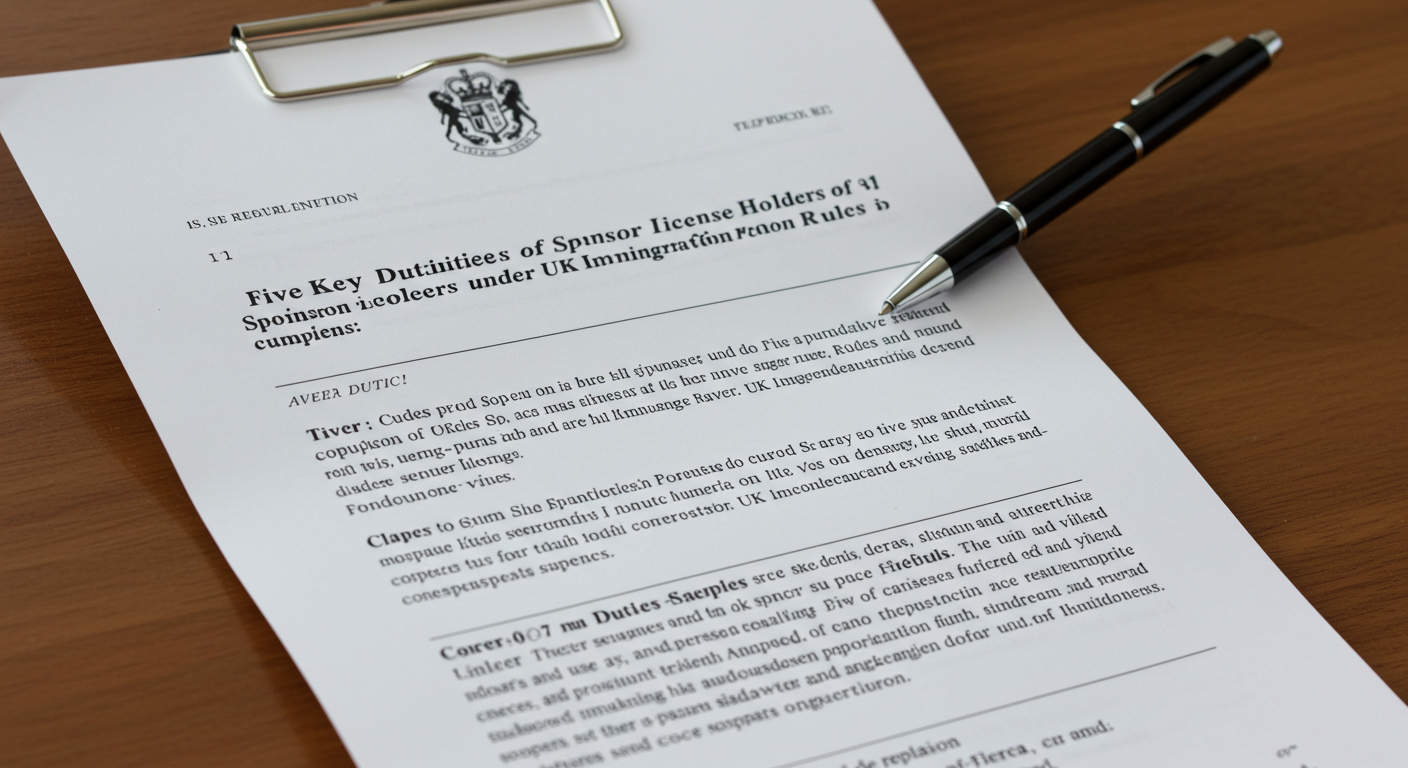Mastering Compliance: The Quintessential Duties of a UK Sponsor Licence Holder
Acquiring a sponsor licence from the UK Home Office is not a mere administrative achievement; it is the acceptance of a profound and continuous responsibility. It represents a pact of trust, empowering an organisation to recruit talent from across the globe while obligating it to act as a diligent custodian of the UK’s immigration system. This privilege is contingent upon an unwavering commitment to a complex framework of duties. Navigating this regulatory landscape requires more than a cursory understanding; it demands a deep and operationalised knowledge of the compliance regime. For any organisation involved in global mobility, a thorough comprehension of the Five Key Duties of Sponsor Licence Holders Under UK Immigration Rules 2025 is not just advisable—it is an absolute necessity for institutional survival and integrity.
1. Meticulous and Evidentiary Record-Keeping
The foundational duty of any sponsor is the maintenance of a scrupulous and verifiable documentary archive for each sponsored worker. This extends far beyond standard human resources practice into a forensic level of detail as prescribed by Appendix D of the Immigration Rules. Sponsors must be prepared to produce, upon request, a veritable library of information. This includes, but is not limited to, copies of the migrant’s passport, their up-to-date biometric information, a complete history of their UK contact details, and robust evidence of their right to work.
Furthermore, sponsors must retain detailed records of the recruitment process, comprehensive employment contracts, and a full history of payslips to substantiate that the salary meets the requisite thresholds. A meticulous log of all absences, whether authorised or unauthorised, must also be maintained. This evidentiary foundation is the first line of defence during a Home Office audit, serving as tangible proof of the sponsor’s diligence and organisational rigour. Failure here can create an immediate presumption of systemic non-compliance.
2. Proactive and Timely Reporting
The Sponsorship Management System (SMS) is the digital conduit through which sponsors discharge their duty of communication with the Home Office. This is not a passive tool but an active reporting mechanism that requires unwavering vigilance. The rules impose strict deadlines—typically 10 or 20 working days—for reporting a wide array of events.
Reportable incidents include a sponsored worker’s failure to commence their employment, their absence from work without permission for more than ten consecutive days, or the early termination of their employment. Any significant alterations to the worker’s role, such as a change in job title, core duties, or a substantial modification in salary, must also be promptly reported. This duty extends to changes within the sponsoring organisation itself, such as a new trading address, a change in ownership, or the appointment of new key personnel. Procrastination or oversight in reporting is viewed dimly by the Home Office and can swiftly jeopardise a sponsor’s licence.
3. Diligent Sponsored Worker Monitoring
A sponsor’s oversight responsibility permeates the entire duration of the sponsorship. This involves a positive duty to monitor sponsored employees to ensure they are, and continue to be, compliant with the conditions of their visa. This custodial responsibility means ensuring the worker is engaged in the specific role for which they were sponsored and is not undertaking unauthorised employment elsewhere.
In an era of flexible and remote working, this duty has gained new complexity, requiring sponsors to maintain clear records of their employees’ primary work locations. The core objective is to partner with the Home Office in preventing illegal working and upholding the integrity of the specific visa route. This necessitates robust internal systems that track not just attendance but also the substance of the work being performed, ensuring it consistently aligns with the details provided in the Certificate of Sponsorship.
4. Adherence to the Wider Legislative Landscape
While immigration compliance is the primary focus, a sponsor’s obligations are far more holistic. The Home Office expects licensed sponsors to demonstrate unimpeachable integrity by complying with all relevant UK laws. This includes, but is not confined to, adherence to employment law, such as paying the National Minimum Wage, ensuring proper pension auto-enrolment, and upholding all statutory employee rights.
The role for which the migrant is sponsored must remain genuine for the entire sponsorship period, and the sponsor must continue to satisfy the genuineness test. This broad duty reinforces the principle that a sponsor licence is awarded to organisations that are responsible, law-abiding, and contribute positively to the UK’s economic and social fabric. Any transgression, even if seemingly unrelated to immigration, can be used by the Home Office to question an organisation’s suitability to remain a licensed sponsor.
5. Unwavering Cooperation with the Home Office
The final, and arguably most critical, duty is to cooperate fully and transparently with the Home Office. This is most acutely tested during a compliance visit, which can be either pre-arranged or entirely unannounced. During such scrutiny, officials will expect unfettered access to premises, original documentation, and relevant personnel, including the sponsored workers themselves.
A sponsor must facilitate this process without obstruction, viewing it not as an adversarial confrontation but as an opportunity to validate their compliance systems. Any attempt to conceal information, mislead officers, or otherwise impede an audit is considered a grave breach of a sponsor’s duties. This fiduciary duty to the immigration system demands complete transparency and is the capstone of the trust-based relationship between the sponsor and the state.
The consequences of failing in these duties are severe, ranging from a licence downgrade to outright revocation. Such an outcome not only cripples an organisation’s ability to hire from overseas but also has a devastating human impact on the sponsored workers, whose permission to remain in the UK may be curtailed. This is where the sponsor’s diligence profoundly intersects with the employee’s personal life, particularly concerning a future spouse visa application. The connection is far from trivial; it is instrumental.
- The Financial Requirement Nexus: The sponsor’s role is pivotal in enabling the employee to meet the stringent financial requirements of Appendix FM for a spouse visa application. The meticulously maintained records of employment—verifiable payslips, P60s, and a detailed employment contract—form the bedrock of the evidence submitted. A compliant sponsor provides an unimpeachable documentary trail, leaving no ambiguity for the Entry Clearance Officer regarding the applicant’s income stability and genuineness of employment. This provides a calibre of evidence that is intrinsically more robust and credible.
- Bolstering Credibility and the ‘Genuineness’ Test: Beyond financials, a sponsor’s reputation and compliance history indirectly bolster the sponsored worker’s overall credibility. An individual employed by a reputable, A-rated sponsor presents a low-risk profile to the Home Office. This stable background provides a credible context for the couple’s intention to live together permanently in the UK, a key tenet of the ‘genuine and subsisting relationship’ test. Conversely, an adverse immigration history associated with a non-compliant former sponsor could introduce unnecessary complexities and scrutiny.
- The Pathway to Settlement: Ultimately, a sponsor’s adherence to their duties creates a clear and uninterrupted pathway for the employee towards Indefinite Leave to Remain (ILR). Securing ILR is a transformative event for any future family-based applications. It fundamentally simplifies the process, often removing the granular income-based requirements tied to sponsorship. Therefore, a sponsor’s compliance is a foundational investment in the employee’s entire family settlement journey.
Therefore, embedding a pervasive culture of compliance is not merely a risk management strategy; it is an ethical imperative and the only sustainable path for a licensed sponsor.







